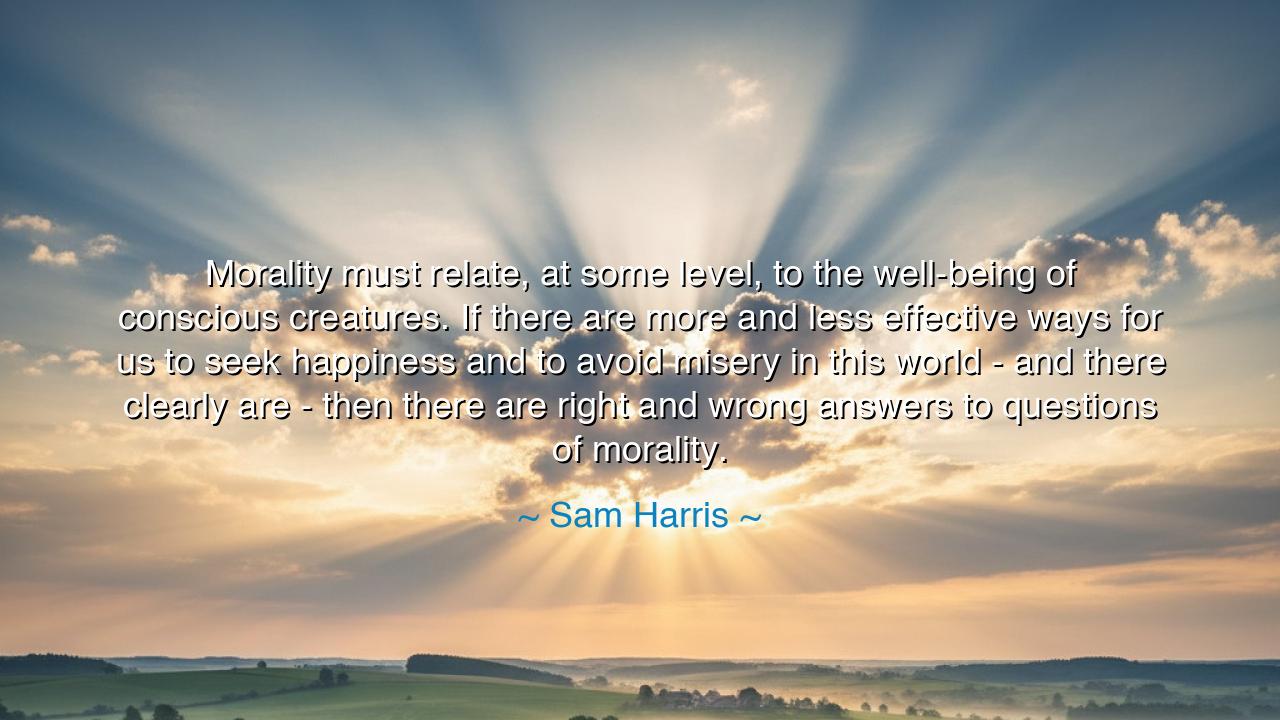
Morality must relate, at some level, to the well-being of
Morality must relate, at some level, to the well-being of conscious creatures. If there are more and less effective ways for us to seek happiness and to avoid misery in this world - and there clearly are - then there are right and wrong answers to questions of morality.






In every age, the wise have pondered the meaning of morality, that invisible thread that binds one soul to another, that law written not upon stone, but upon the heart of every living being. In our modern time, the thinker Sam Harris speaks with the clarity of the ancients when he declares: “Morality must relate, at some level, to the well-being of conscious creatures. If there are more and less effective ways for us to seek happiness and to avoid misery in this world—and there clearly are—then there are right and wrong answers to questions of morality.” These words pierce through confusion like a blade through mist. They remind us that morality is not a phantom of custom nor a relic of belief—it is the art of living wisely, of shaping a world where well-being triumphs over suffering.
Harris’s insight is as old as the dawn of philosophy and as new as the next heartbeat. The origin of this thought reaches back to the Greek sages who taught that the good life is one lived in harmony with reason, virtue, and the flourishing of all beings. Yet it also echoes the teachings of the Buddha, who spoke of the cessation of suffering and the path to happiness as the true measure of right and wrong. Across the millennia, from the temples of Athens to the monasteries of the East, the wise have agreed on one truth: morality must be measured not by ritual, tribe, or tradition, but by its effect upon the living soul—whether it brings peace or pain, joy or despair.
To live morally, then, is not to obey blindly, but to understand deeply. The moral man is not the one who kneels most often, but the one who lifts another from the dust. He is not bound by the narrow codes of his nation or his creed, but by the vast responsibility of consciousness itself. When Harris speaks of “conscious creatures,” he reminds us that morality cannot exclude any being capable of feeling—not the poor, not the stranger, not even the silent creatures who share our world. The cry of a suffering child, the fear of a hunted animal, the loneliness of the forgotten—these are moral truths, more ancient than scripture, more sacred than any crown.
History, too, bears witness to the power of this principle. Consider the abolition of slavery. For centuries, men justified chains with laws and scriptures, declaring such cruelty righteous. Yet the awakening of moral vision came not from divine decree but from empathy—from the understanding that to enslave another’s body was to wound the shared soul of humanity. It was the recognition of suffering that turned hearts against oppression, and the pursuit of well-being that drove reform. When the chains were broken, it was not only the enslaved who were freed; the masters, too, were released from the blindness of their own cruelty. Thus, morality advanced not through obedience, but through compassion grounded in truth.
There are indeed right and wrong answers to moral questions, just as there are right and wrong ways to heal a wound or nurture a garden. If we act in ways that increase misery, we err; if we act in ways that cultivate happiness, understanding, and love, we move toward the good. Yet the path is not always clear, for ignorance is a fog that dims the light of conscience. This is why the pursuit of knowledge—scientific, philosophical, and spiritual—is sacred. To learn what fosters well-being is to learn how to live rightly. Knowledge, when guided by compassion, becomes the map of morality itself.
But beware: morality without compassion becomes tyranny, and compassion without wisdom becomes folly. The ancients would tell us that the two must walk hand in hand, like light and warmth from the same flame. To care for the well-being of others is not merely to spare them pain—it is to help them flourish, to awaken the divine spark within every heart. A society that forgets this truth becomes sick, for no wealth, no conquest, no invention can redeem a world where souls languish in suffering.
So let this teaching be carried forward: the measure of right and wrong lies in the impact upon the living spirit. Ask not, “Is it permitted?” but “Does it lessen or deepen the pain of the world?” Ask not, “Is it tradition?” but “Does it make us more whole, more compassionate, more free?” In every act, from the smallest kindness to the greatest decision, let the guiding light be the well-being of all conscious beings.
And if you would live wisely, begin each day with this resolve: to bring more joy than sorrow, more healing than harm. Speak words that mend, act with hands that serve, think thoughts that uplift. For in doing so, you do not merely live morally—you become a vessel of light in a darkened age, a keeper of the ancient fire of goodness that no darkness can extinguish.






AAdministratorAdministrator
Welcome, honored guests. Please leave a comment, we will respond soon